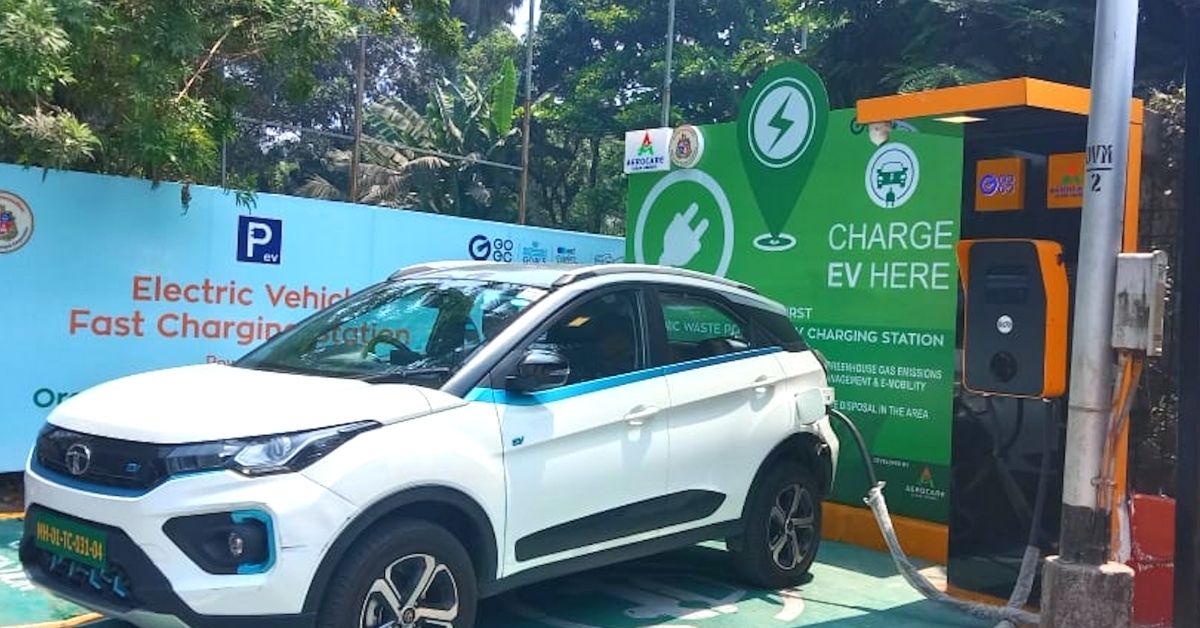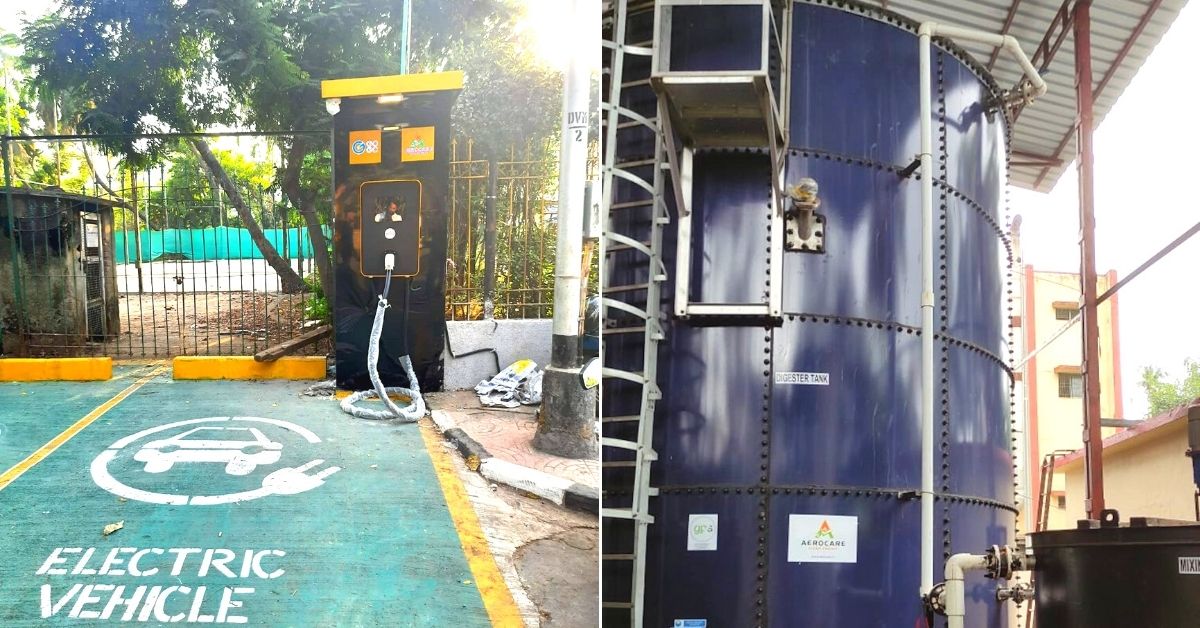Powered by Biogas, IIM Grads’ Charging Station Can Fully Charge Your EV In 45 Minutes
Bengaluru-based 'green innovation company' GPS Renewables has developed an EV charging station that uses biogas to fully charge vehicles in a short time.

Merely switching from petrol to electricity isn’t enough to power India’s push towards electric mobility, clean air, and a cleaner future. It’s imperative that the electricity generated for the country’s e-mobility push comes from more eco-friendly sources.
(Image above of EV getting charged at the charging station in Haji Ali, Mumbai powered by biogas)
While solar energy remains a popular choice for this transition, GPS Renewables, a Bengaluru-based ‘green innovation company’, is looking at biofuels.
Founded by IIM graduates Mainak Chakraborty and Sreekrishna Sankar in 2012, the company set up an EV charging station earlier this month, powered by biogas in Haji Ali, Mumbai, and with support from the Biotechnology Industry Research Assistance Council (BIRAC) and Aerocare Clean Energy. A ‘first-of-its-kind’ project conceptualised and executed by GPS, the biogas is generated from a biomethane plant alongside the charging station.
“The inspiration behind this initiative is to establish the infrastructure that is 100 per cent green, and in turn drive large scale adoption of sustainable behaviour. Therefore, with the motive of making EV an end-to-end green model, GPS decided to commission this prototype of a charging station at Haji Ali. We are now on a mission to replicate this model across EV charging stations in the country,” says Rajesh Ayappassur, director of Business Development and Partnerships at GPS Renewables, speaking to The Better India.
Just one of these biogas powered charging stations is responsible not only for potentially cutting greenhouse gas emissions, but also instrumental in creating value out of waste.
How does it work?
Traditionally, diesel or petrol is used to power an electricity generator that is typically used as power back up in apartments, societies, offices and institutions.
“In the case of our EV charging station, the diesel/petrol is replaced by biogas, a green fuel alternative. Purified biogas is fed into a genset designed to use biogas as fuel, which in turn produces current. This renewable power then becomes the input to the charging station, which supplies renewable energy to charge the electric vehicles (EVs). While the correlation depends on several constraints and variables, on an average, and when at 100 per cent capacity utilisation, this particular plant produces nearly 240 cubic metres of biogas in a given day, which can be used to power eight cars (like Tata Nexon EV) completely,” claims Rajesh.
Compared to an average of 4 hours that is taken by others, this particular EV charging station takes up to an efficient 45 minutes to charge a car to 100%. Currently around two to three operators are required for the optimum operation of this plant, end-to-end.
“This is owing to the efficient design of the system, to which we envision future automation so as to remove complete manual dependency. The price of charging an EV at this particular biogas powered charging station is Rs 15 per kWh (unit) not inclusive of GST,” he adds.

Sourcing food waste
This particular biomethanation plant sources its input produce from establishments in its local surroundings itself. Restaurants, motels, hotels and small eateries in and around the region discard organic wet waste that goes as feedstock into the plant. This waste is collected and brought to the site by green waste collector trucks appointed by the Municipal Corporation of Greater Mumbai (MCGM).
The capacity of the biogas plant in Haji Ali is two tonnes of organic waste per day. On a daily basis, it would need between one and two tonnes of wet waste to remain operational.
“While the plant was commissioned within 4-5 months from ideation, the challenges we faced were mostly with respect to the operations of the charging station. For instance, the biogas plant can be utilised to its full capacity, and thereby be used to charge maximum vehicles only when there is a good amount of input feedstock in the form of the wet waste. While initially setting up sources for this was a bit of a challenge, GPS has now been able to streamline this process by onboarding sufficient partners to supply the organic waste,” says Rajesh.
Working with biogas and looking ahead
As stated earlier, GPS is a green innovation company with a specific focus on biofuels.
“Be it in technology or in process, we are constantly innovating in the field of renewable energy using biofuels, which is spearheaded by a decorated group of scientists, engineers and leaders. Today, GPS is a company of more than 100 employees leading sustainable transformation using biofuels. We have a passionate team of leaders with extensive experience who are well-respected figures across the oil, energy and biofuel industries,” says Mainak.
GPS Renewables is also a fast growing Bio-Energy TEPC company, which specialises in building mega scale turnkey infrastructure for biofuel production and supply. “Our core competence lies in engineering, design, construction and project management that is specific to the bio-energy segment. A first of its kind in the entire industry, GPS Renewables today offers Project Management as a Service (ProDaaS). GPS’ ProDaaS offering is meant for bioenergy project developers, who are looking for an end-to-end partner. We ensure 360º collaboration starting from the project selection, signup and incubation, to the deal structuring to the eventual execution,” claims Mainak.
The company closed their last round of funding from Neev Fund II managed by SBICap ventures. GPS has cumulatively raised close to $20 million in the form of equity. In February 2022, they officially commissioned Asia’s largest BioCNG plant with the capacity to process 500 tonnes of organic waste per day in Indore. This plant was inaugurated by Prime Minister Narendra Modi.
“On one hand, there are more than 100 of our biogas plants established and operational across India today, while on the other hand, we are en-route to the commissioning of what would be the world’s largest biogas plant in Hyderabad. In fact, we have already started incubating this project to transform the compostable fraction of MSW (Municipal Solid Waste) into BioCNG. As a green innovation engine, GPS today holds more than four patents in our field of expertise, with several more pending,” adds Rajesh.
(Edited by Divya Sethu)
Like this story? Or have something to share? Write to us: [email protected], or connect with us on Facebook and Twitter.
If you found our stories insightful, informative, or even just enjoyable, we invite you to consider making a voluntary payment to support the work we do at The Better India. Your contribution helps us continue producing quality content that educates, inspires, and drives positive change.
Choose one of the payment options below for your contribution-
By paying for the stories you value, you directly contribute to sustaining our efforts focused on making a difference in the world. Together, let’s ensure that impactful stories continue to be told and shared, enriching lives and communities alike.
Thank you for your support. Here are some frequently asked questions you might find helpful to know why you are contributing?


This story made me
-
97
-
121
-
89
-
167













